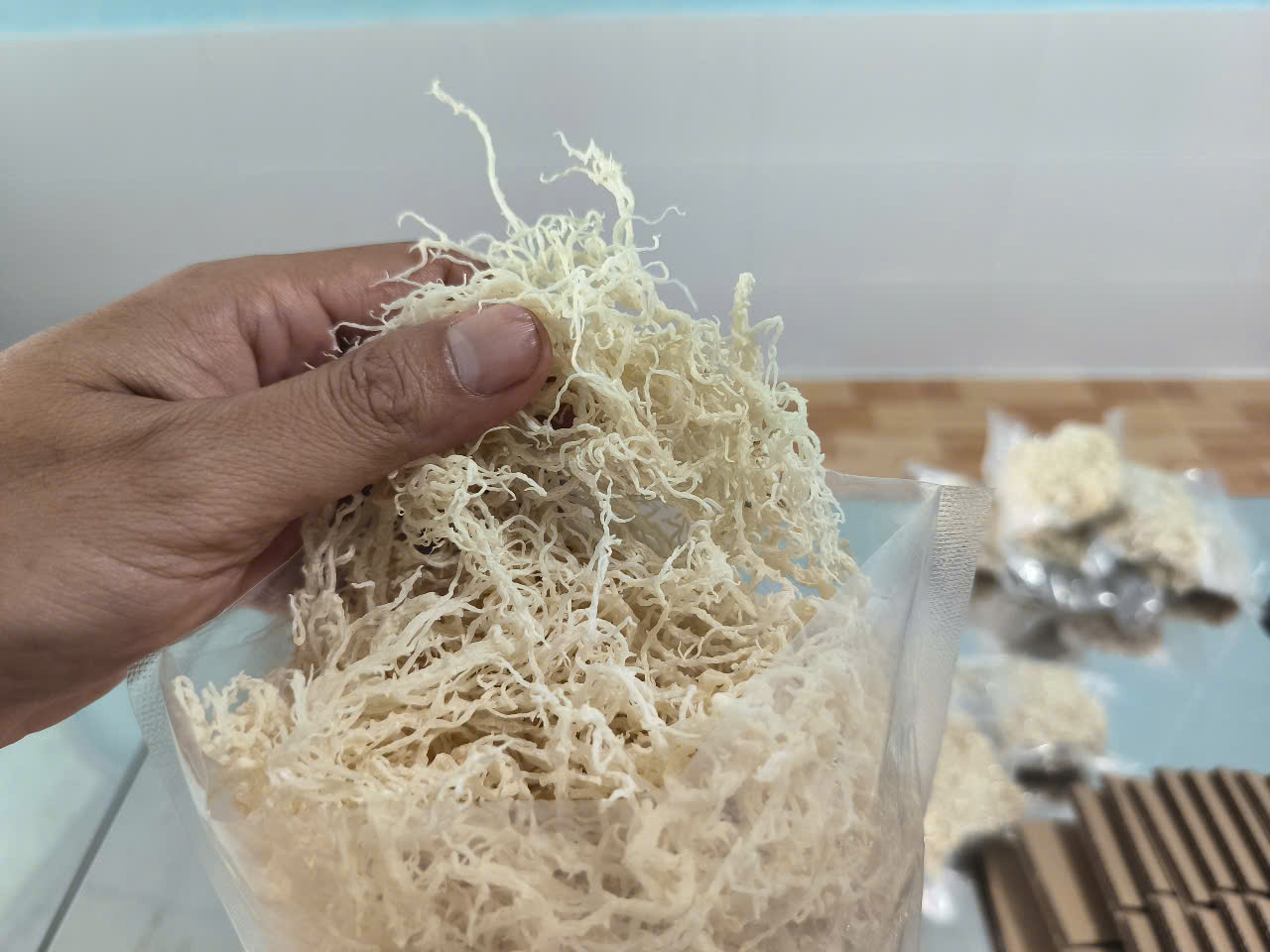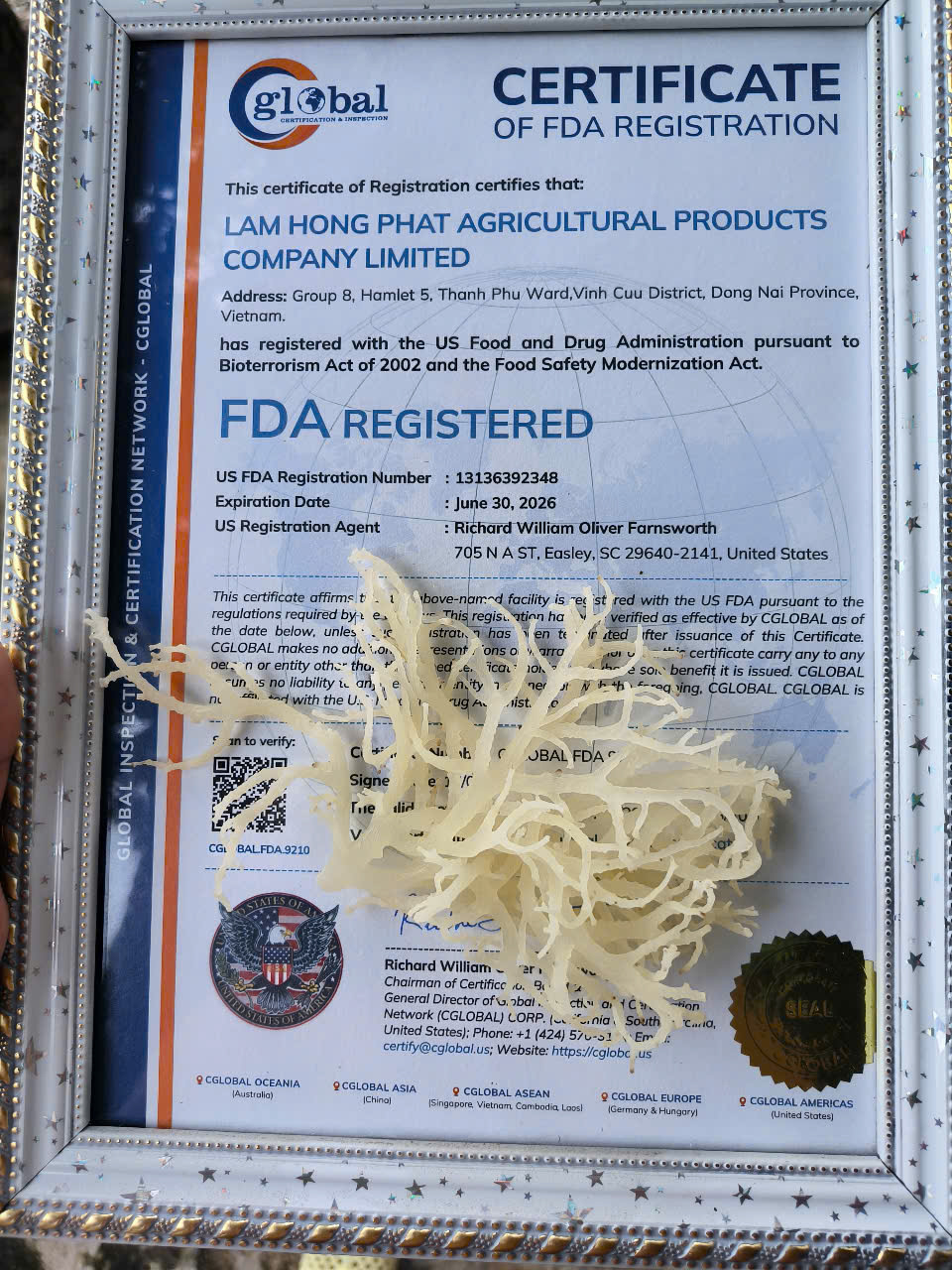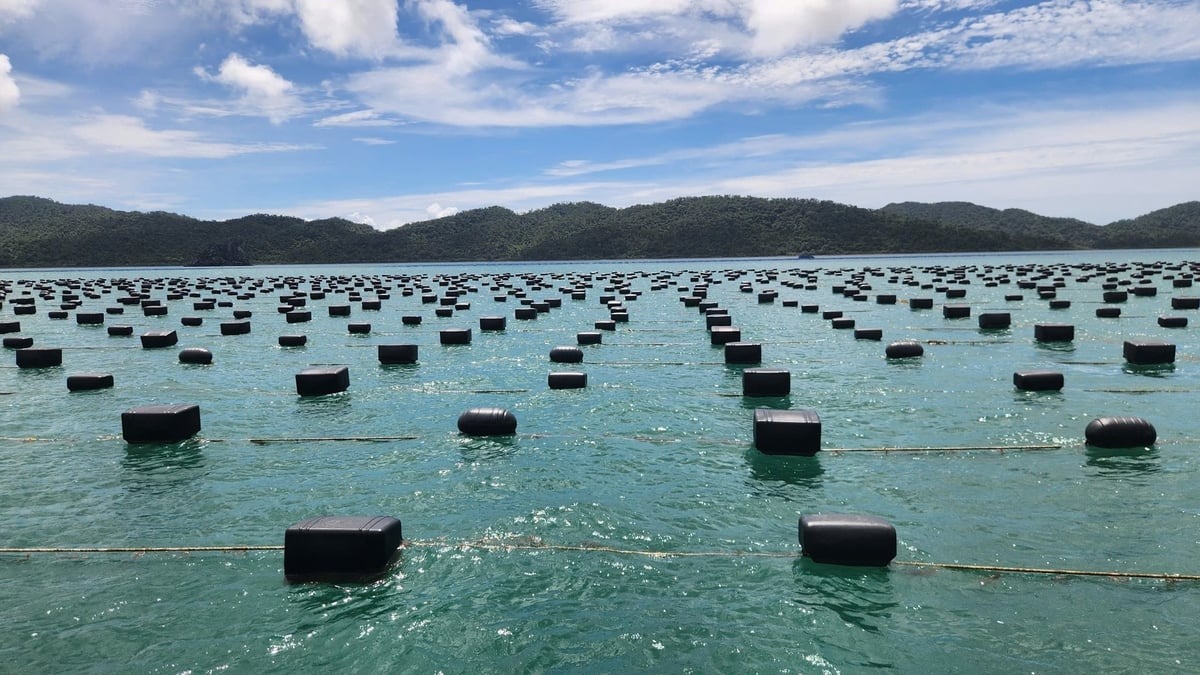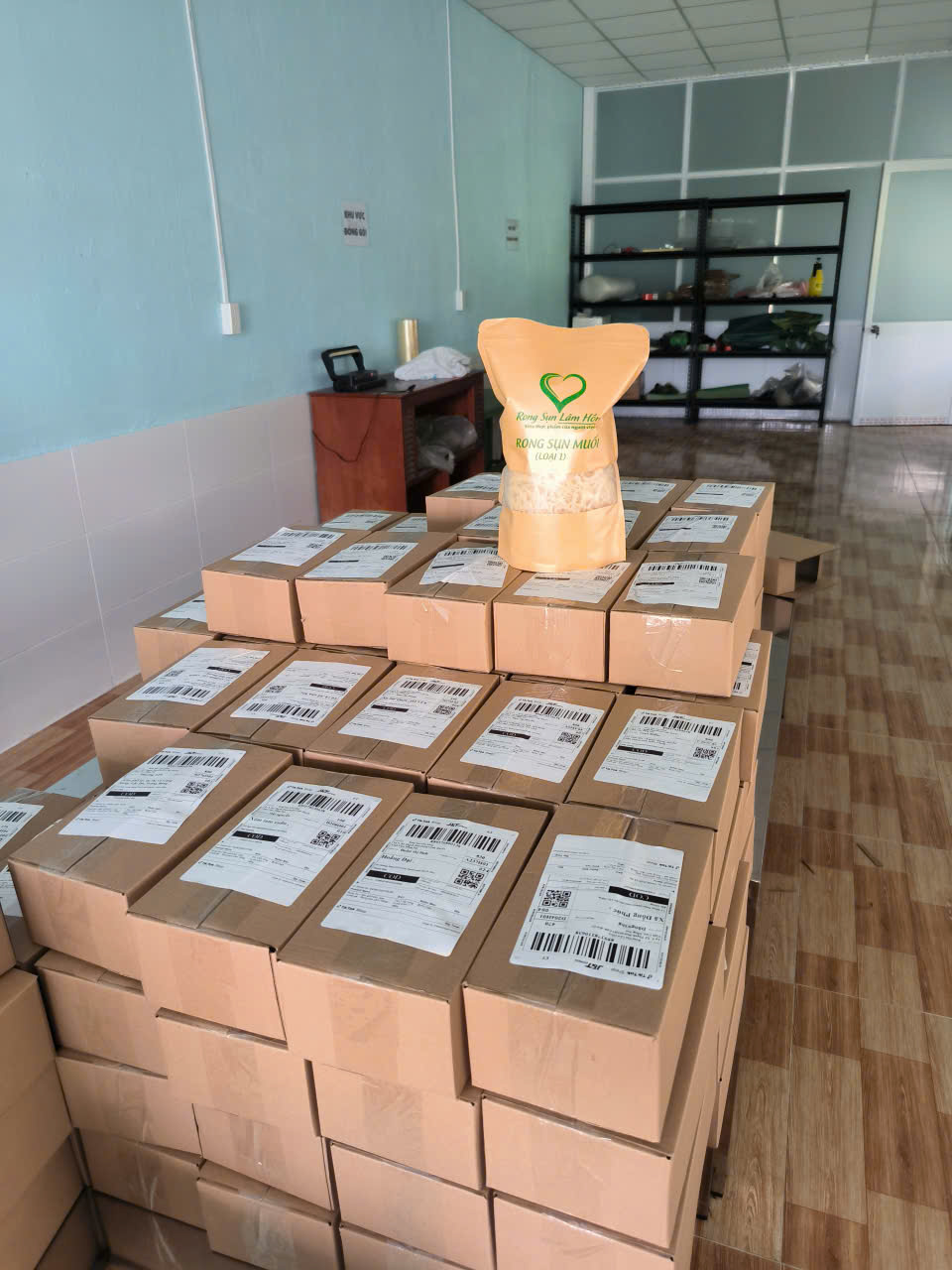As the world shift toward natural, safe, and eco-friendly nutrition, the nutritional benefits of organic sea moss are gaining increasing attention across global industries. No longer just a traditional ingredient from coastal regions of Asia, organic sea moss is now recognized as a superfood with wide applications in modern health, functional food, and beauty sectors.
Rich in essential minerals, antioxidants, and plant-based collagen, sustainable organic sea moss offers not only health-enhancing properties but also meet the rising consumer demand for clean-label and environmentally responsible products.
For businesses seeking to incorporate high-quality organic ingredients into their manufacturing processes, exploring the full nutritional benefits of organic sea moss is a smart move. Whether you're in the functional food industry, plant-based product development, or natural cosmetics, this ingredient brings both performance and marketing value.
If you're considering sourcing this powerful raw material, contact Lam Hong, a trusted supplier of sustainable organic sea moss in Vietnam, and gain access to a consistent, traceable, and certified organic supply chain.

Lam Hong Organic sea moss products
1. Nutritional benefits of organic sea moss: a comparative highlight
Organic sea moss, particularly the Eucheuma spinosum variety, is increasingly recognized as a global superfood due to its outstanding nutrient profile. But how does it compare to other nutrient-rich marine ingredients such as sea grapes (Caulerpa lentillifera), Spirulina, or kelp? This section will explore whether the nutritional benefits of organic sea moss truly stand out.
Nutritional comparison (per 100g dried material):
|
Nutritional Indicator |
Organic Sea Moss |
Spirulina |
Sea Grapes |
Kelp |
|
Iodine Content |
250–350 mcg |
50–100 mcg |
35–50 mcg |
150–300 mcg |
|
Soluble Fiber (Fucoidan) |
4–6g |
<1g |
0.5g |
3–5g |
|
Carrageenan (Natural Gelling Agent) |
15–20g |
None |
None |
None |
|
Magnesium |
40–65 mg |
19 mg |
12 mg |
60 mg |
|
Iron |
8–9 mg |
28 mg |
1.5 mg |
2.85 mg |
|
Protein |
5–6g |
57g |
0.9g |
1.7g |
Comparative insights:
- Organic sea moss has a clear advantage in iodine content, soluble fiber, and natural carrageenan – a unique element absent in the other compared ingredients.
- While it does not match Spirulina in protein, sea moss excels in supporting thyroid function, digestion, and is ideal for functional food production.
- Compared to sea grapes, dried sea moss is easier to store, process, and provides more consistent quality for industrial manufacturing.

Lam Hong's products have achieved many international quality certificates.
The nutritional benefits of organic sea moss come not only from its diverse composition but also in its wide applications across food, cosmetics, and pharmaceutical industries. When derived through organic sea moss farming for sustainable food, it also meets growing demands for traceability and eco-conscious production.
Leading suppliers like Lam Hong support sustainable organic sea moss cultivation and ensure full compliance with organic sea moss traceability and testing protocols, making it a strategic choice for businesses seeking clean, traceable, and nutrient-rich raw materials.
2. Sustainable farming: Why choose Ninh Thuan and Khanh Hoa?
Organic sea moss farming for sustainable food is emerging as a global trend, especially in Southeast Asia, where Vietnam, the Philippines, and Indonesia are the top producers of Eucheuma.
Comparison of cottonii sea moss farming regions in Southeast Asia:
|
Criteria |
Ninh Thuan – Khanh Hoa (Vietnam) |
Mindanao (Philippines) |
South Sulawesi (Indonesia) |
|
Water purity |
High – low industrial activity |
Average – nearby extractive activities |
Localized pollution in some areas |
|
Harvest frequency |
Every 35–45 days, stable year-round |
Seasonal-dependent |
Seasonal-dependent |
|
Control systems |
HACCP, farm traceability available |
Limited nationwide systems |
Mostly small-scale household farms |
|
Sustainability |
Cooperative-based integrated planning |
Predominantly unregulated farming |
No clear Organic direction yet |
|
Harvest methods |
Manual, strong microbiological control |
Primarily bulk harvesting |
Inconsistent post-harvest sanitation |
|
Traceability & export readiness |
High – certified for EU and US markets |
Moderate – often lack detailed certificates of origin |
Slow in achieving organic certification |
Comparative conclusion:
Ninh Thuan and Khanh Hoa hold a significant advantage in sustainable organic sea moss farming, with transparent traceability systems. These are critical factors in meeting export standards for sustainable organic sea moss in markets such as the US, EU, and Japan.

Lam Hong Organic sea moss farming site
In this region, reputable producers like Lam Hong have established well-defined cultivation areas, employing clean farming practices, natural sun-drying tailored to specific market requirements.
If you're looking for organic sea moss traceability and testing, Vietnam offers an optimal choice, delivering both reliable quality control and competitive cost structures.
3. Organic sea moss traceability and testing: A prerequisite for accessing premium markets
In today’s modern supply chains, organic sea moss traceability and testing is no longer a value-added feature, it is a mandatory requirement for businesses aiming to enter strict markets such as the EU, the United States, and Japan.
3.1. Why are traceability and testing essential?
Traceability enables businesses to demonstrate the entire lifecycle of the product: from seed stock, farming location, harvest timing, and processing method to transportation.
Testing provides scientific proof of quality, including carrageenan content, moisture levels, heavy metals, and harmful microorganisms.
According to international standards, a batch of sustainable organic sea moss must meet the following certification requirements:
|
Certification |
Scope of Verification |
Market Requirements |
|
COA (Certificate of Analysis) |
Composition, moisture, heavy metals, microbes |
Mandatory in the EU and US |
|
HACCP, ISO 22000 |
Food safety and processing control |
Required for processing facilities |
|
Organic Certification |
Chemical-free, clean farming practices |
Required for organic labelling |
|
Phytosanitary Certificate |
Plant quarantine and health clearance |
Required for export to developed countries |
3.2. Can Vietnam meet these standards?
In regions like Ninh Thuan and Khanh Hoa, suppliers such as Lam Hong have implemented a fully controlled supply chain from farm to FOB container. Each shipment of Organic sea moss is tagged with traceable farming codes and supported by independent lab testing reports from accredited international laboratories.
This ensures B2B buyers complete confidence in origin and quality, minimizing risks of shipment rejections, costly logistics losses, and reputational damage.
Integrating organic sea moss into a global brand strategy
In today’s era where brands no longer sell just products, but a way of life incorporating sustainable organic sea moss as part of a brand’s core strategy has become a growing trend among international enterprises.

Lam Hong organic sea moss storage facility (post-processing)
3.3. Why should you integrate organic sea moss?
Enhance your brand’s “green” positioning
Modern brands are increasingly shifting away from synthetic ingredients and moving towards organic, clean-label, vegan, and plant-based alternatives. This shift not only aligns with evolving consumer preferences but also enables brands to:
- More easily meet international compliance standards.
- Gain access to premium markets.
- Fulfill ESG (Environmental, Social, Governance) criteria.
Craft a unique brand story
By using organic sea moss sourced from the pristine waters of Vietnam, hand-harvested and rigorously tested, brands can tell a compelling “ingredient journey” through their packaging, TV commercials, or website:
“We choose sea moss from Ninh Thuan, where the pure sun and wind produce naturally superior quality...”
Build emotional connection with global consumers
Today’s customers don’t just want products that work, they want to understand why they work.
A product containing organic sea moss that is traceable and clean offers consumers a sense of safety, while also reflecting your brand’s ethical commitment and transparency.
Increase market expansion and B2B collaboration opportunities
Distributors in the U.S., Japan, Korea, and the EU are increasingly requiring that ingredients must:
- Be Organic Sea Moss with full traceability.
- Include comprehensive COA and laboratory testing.
- Be cultivated in sustainable marine environments.
If your business offers products containing such ingredients, your chances of approval for distribution through premium global platforms like Amazon Organic, Whole Foods, Edeka (Germany), or organic spa chains across Europe will be significantly higher.
If you have already recognized the nutritional benefits of organic sea moss and are seeking a trusted supplier in Nha Trang, Vietnam, be sure to contact Lam Hong to ensure you don’t miss a reliable source.






